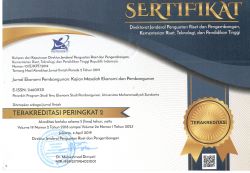BEBERAPA FAKTOR YANG MEMPENG ARUHIMIGRASI TENAGA KERJA INDONESIA (TKI) KE LUAR NEGERI
Waridin Waridin(1*)(1) Fakultas Ekonomi Universitas Diponegoro, Semarang
(*) Corresponding Author
Abstract
The difference of economic conditions and job opportunities inter countries can be one of the causes why manpower migration to the socially and economically beneficial countries happens. This research is aimed at analyzing some factors, which effect TKI (Indonesian Man Power) migration to foreign countries. Beside, this study is also aimed at analyzing the migration patterns of Indonesian Man Power to work abroad. The sampling method is carried out with multi stage, namely according to the Job groups power working in target countries. To analyze the factors which effect why Indonesian manpower migrates and works abroad is used "place utility" model or modificated "migration intention". Using logic binary regression and logic multinomial carries out data analysis.
The analysis outcome shows that there are five factors which effect why Indonesian manpower migration and works abroad, i.e. marital status, family burden, social, economic, and job experience factor. While other factors, statistically cannot explain how Indonesian man power work and stay abroad. Seen from statistic significance, the main factors which effect the Indonesian manpower intention to work abroad are job experience abroad, the number of income, maritalstatus, the number of family burden, and the length of stay in the target country.Keywords
Full Text:
PDFReferences
Bandiono, S. dan Alihar, F. (1999). Tinjauan Penelitian Migrasi Internasional di Indonesia. Bandung: Penerbit Alumni.
Becker, G.S. (1968). Crime and Punishment: An Economic Approach. Journal of Political Economy. Vol.76(2): p. 169-217.
Effendi, T.N. (1999). Tinjauan Penelitian Migrasi Internasional di Indonesia. Bandung: Penerbit Alumni.
Gujarati, D. (1995). Basic Econometrics. 3rd Edition. International Edition. Singapore: McGraw-Hill.
Hugo, G. (1992). Indonesian Labour Migration to Malaysia: Trends and Policy Implication. Kuantan: Universiti Malaya Cawangan Kuantan.
______(1995). International Labour Migration and Family: Some Observation from Indonesia. Asian and Pacific Migration Journal. Vol. 4, No. 2-3. p. 273-301.
Keban, Y.T. (1994). Studi Niat Bermigrasi di Tiga Kota: Determinan dan Intervensi Kebijakan. Prisma. No.7, Juli 1994.
Kmenta (1990). Introduction to Econometrics. Singapore: McGraw-Hill.
Lee, E. (1966). "A Theory of Migration". Demography. Vol.3, p.47-57.
Maddala, G.S. (1992). Introduction to Econometrics. Second Edition. Prentice Hall.
Mantra, I. B., Kasto, Keban, Y.T. (1999). Mobilitas Tenaga Kerja Indonesia ke Malaysia: Studi Kasus Flores Timur, Lombok Tengah, Pulau Bawean. Yogyakarta: Pusat Penelitian Kependudukan, Universitas Gadjah Mada.
Nasution, A.M. (1999). Globalisasi, Migrasi Pekerja Antar Negara dan Prospeknya (Kasus TKI di Kuala Lumpur Malaysia). Bandung: Penerbit Alumni.
Nasution, A. M. (1997). Aliran Pekerja Indonesia ke Malaysia: Kes Tentang Pekerja Indonesia Dalam Sektor Pembinaan di Kuala Lumpur, Malaysia Tesis Doktor Falsafah, Universiti Kebangsaan Malaysia.
Simmons, A. B. (1986). Recent Studies on Place-Utility and Intention to Migrate: An international Comparison. Population and Environment. Vol.8 (1 and 2).
Speare Jr, A. (1974). Interpreting the Migration Data from the 1971 Census. Majalah Demografi Indonesia. Vol.2(3), hal.66-68.
Susilowati, I. (1998). Faktor-faktor yang Mempengaruhi Niat Tenaga Kerja Indonesia (TKI) Bermigrasi Ke Malaysia (Studi kasus di kawasan Selangor, Malaysia). Majalah Penelitian Lembaga Penelitian, UNDIP. Tahun X, No. 40, Desember 1998.
Tamtiari, W. (1999). Dampak Sosial Migrasi Tenaga Kerja ke Malaysia. Populasi: Buletin Penelitian Kebijakan Kependudukan. Vol.10, No. 2. p. 36-56.
Triantoro, B.W. (1999). Migrasi Legal dan Ilegal Ke Malaysia Barat: Kasus Migrasi Internasional di Pulau Lombok, NTB. Populasi: Buletin Penelitian Kebijakan Kependudukan. Vol.10, No. 2. p. 3-16.
Tjiptoherijanto, P. (1999). Migrasi Internasional: Proses, Sistem, dan Masalah Kebijakan. Bandung: Penerbit Alumni.
Tyler, T. R. (1990). Why People Obey the Law. New Heaven. Yale University Press.
White, J. K. and S.A. Haun; N.G. Horsman and S.D. Wong (1988). Shazam Econometrics Computer Program. McGraw-Hill Book Company.
Zelinsky, W. (1971). The Hypothesis of the Mobility Transition. Geographical Review. Vol.61, p.219-249.
Article Metrics
Abstract view(s): 1363 time(s)PDF: 3001 time(s)
Refbacks
- There are currently no refbacks.















